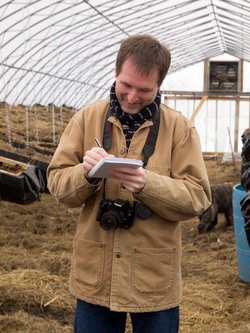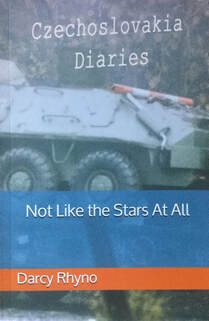Magazine Writer/Photographer and Columnist

Darcy Rhyno is a columnist with Saltscapes magazine. He writes "Roots and Folks: Q&A" in every issue, a story in the form of an interview about an exceptional personality in Atlantic Canada. His subjects have included comedian Shaun Majumder, novelists Donna Morrissey and Kenneth J. Harvey, businessman David Ganong, hockey pioneer Willie O'Ree, sword maker Jake Powning, singer Rita MacNeil, foreign correspondent Stephen Puddicombe and Mi'kmaq artist Alan Syliboy.
Darcy has contributed to many magazines and newspapers in his 25 year career as a freelance writer/photographer including Saltscapes, Canadian Geographic, Sport n Spokes, Atlantic Business Magazine, Maroon and White, Good Taste, Coastal Life, Coastal Communities News, CBC Radio.
Here's a sample of his work, three articles about Prince Edward Island in Atlantic Business Magazine:
http://www.atlanticbusinessmagazine.ca/wp-content/uploads/2011/02/PEI-Local-Resources.pdf
Photo by Gary Crallé
Darcy has contributed to many magazines and newspapers in his 25 year career as a freelance writer/photographer including Saltscapes, Canadian Geographic, Sport n Spokes, Atlantic Business Magazine, Maroon and White, Good Taste, Coastal Life, Coastal Communities News, CBC Radio.
Here's a sample of his work, three articles about Prince Edward Island in Atlantic Business Magazine:
http://www.atlanticbusinessmagazine.ca/wp-content/uploads/2011/02/PEI-Local-Resources.pdf
Photo by Gary Crallé
|
NEW-
Not Like the Stars At All: Czechoslovakia Diaries by Darcy Rhyno A deep dive into daily life in post-communist Czechoslovakia of 1990, this book is based on the diaries of Darcy Rhyno from his time there as a teacher. He lived and worked in a small town just months after the Velvet Revolution and the fall of the Berlin Wall. He gets to know the daily lives of adult students and develops intimate relationships with them and their families. As a backdrop, Czechoslovakia is a country in transition politically and economically, a country that will soon disappear from the world map as President Vaclav Havel leads his people out of decades of communist rule and as the USSR slowly extracts the Soviet military after 22 years of occupation. At the edge of town is a compound that houses military equipment and a Soviet occupying force larger than the population of the town itself. The writer's time in the town parallels the USSR's preparation for departure and the country's efforts to recreate itself as a western democracy. All this he observes from his room in the zamek or rural chateau that overlooks the town square. |

